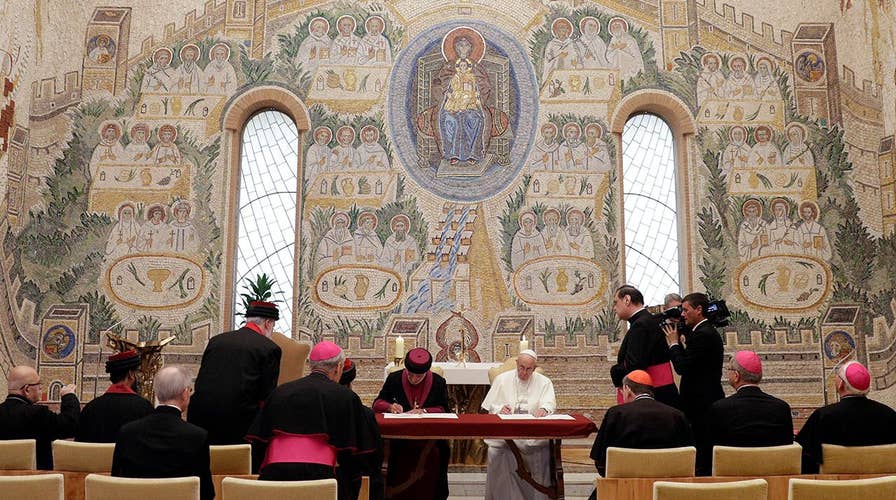Vatican delays vote on clergy sex abuse reform
An abrupt change of plans at the Catholic bishops' bi-annual meeting in Baltimore; religion correspondent Lauren Green reports.
It was anything but business as usual for American bishops meeting in Baltimore, Maryland on Monday for their bi-annual conference. At the last minute, the Vatican inserted its own authority, subverting the planned movement on two crucial proposals dealing with the abuse crisis.
Before even making his opening remarks, Cardinal Daniel DiNardo, the president of the U.S. Conference of Catholic Bishops, made the surprise announcement.
"At the insistence of the Holy See, we will not be voting on the two action items in our documentation regarding the abuse crisis," he said.
It was an abrupt change of plans that meant the bishops would not take action on two crucial measures; one, a new "code of conduct" for bishops, and the other a civilian-led investigative body to look at high-ranking clergy, who cover up abuse or are abusers themselves.
DiNardo labeled it a bump in the road. But Bishop Christopher Coyne of the diocese of Burlington, Vermont expressed frustration.
"People were looking for us to do something. They were seeing some hope, moving in the right direction, so to say, 'OK, you can do everything but end up with an action item at the end’ is frustrating for us, as well as it's frustrating for our people.
The delay also angered victims of clergy abuse and the message it sends.
Peter Isely, of SNAP, the Survivors Network of those Abused by Priests, said he was disappointed.
"What they are telling Catholics and the American public, is basically, 'We care more about our organization and our princely titles and positions than we care about children and we care about Catholics,'" Isely said.
Since the bishops’ last meeting in the spring, they've witnessed the fall from grace of the powerful Cardinal Theodore McCarrick, forced to resign and withdraw from the ministry after it was exposed he engaged in a long history of abusing seminarians and at least one minor.
Then came the bombshell Pennsylvania grand jury report uncovering 300 abusive priests and more than a thousand victims over seven decades. Since then, at least 12 states have opened their own investigations.
Catholic experts call this the biggest crisis for the Roman Catholic church since the Protestant Reformation 500 years ago.
"We ... are seeing now the most consequential and deepest crises in the history of U.S. Catholicism, which is part of a larger crisis in global Catholicism,” said Dr. Massimo Faggioli, a professor of theology and religion at Villanova University.
What's different about this round of clergy sexual abuse from the 2002 version emanating from the Boston Archdiocese? The Church now recognizes what it left undone — addressing the issue of the bishops' role in the continuing crisis — that some bishops either were part of the problem in shuttling abusive priests to different parishes or, like in the case of Cardinal McCarrick, were the abusers themselves.
But Faggioli says, "It was very difficult back then to imagine that the bishops were the beginning of the problem. So the dilemma is how can a church that is globally and nationally in control, in the control of the bishops, police the bishops themselves?"
But what is even more compelling this time is the human toll that has become a constant and ever-present reality.
Luis A. Torres, an abuse survivor, spoke to the bishops of his lifelong pain of being abused by a trusted priest he admired.
"The abuse of a child is the closest you can get to murder,” Torres said, “and still have a breathing body before you."
The Vatican gave no specific reason for directing the American bishops to stand down on any decisive vote. One expert speculated that because the abuse crisis is a global problem, the Vatican wants to set global standards when Pope Francis meets with all of the bishops when they gather in Rome in February for an unprecedented meeting he has called to deal with the clergy abuse crisis.


